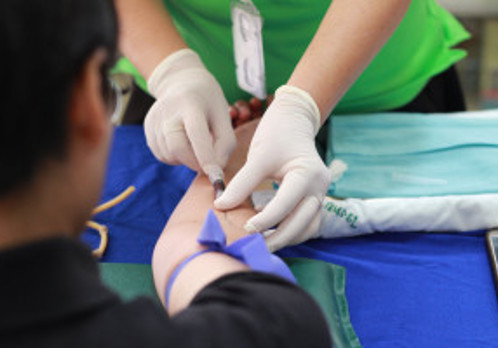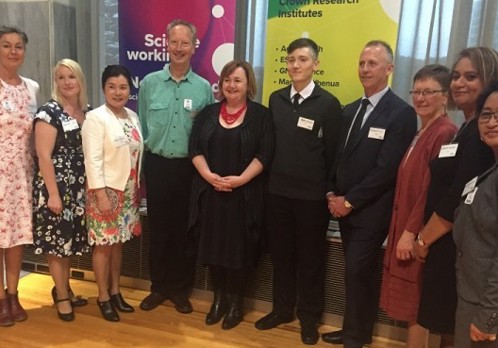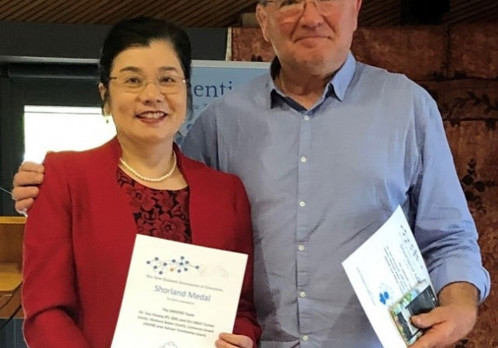Influenza (flu), unlike a common cold, is a serious illness affecting hundreds and thousands of people globally and in New Zealand, particularly young children and the elderly. Led by ESR, the SHIVERS (Southern Hemisphere Influenza, Vaccine Effectiveness, Research & Surveillance) and WellKiwis studies are a long series of research aimed at improving the understanding of influenza and other respiratory viruses, to help us better understand the flu, develop better vaccines, improve respiratory health and prevent future pandemics.
SHIVERS was conducted during 2012-2017 and involved two enhanced population-based surveillance systems covering 906,000 residents in the Auckland District Health Board (ADHB) and Counties Manukau District Health Board (CMDHB) regions:
- Hospital-based surveillance for acute respiratory infections at Auckland City, Starship, Middlemore and Kidz First from 2012 to 2016. The New Zealand Ministry of Health (MoH) has funded severe acute respiratory infection (SARI) surveillance at these hospitals since 2016.
- Community based surveillance for influenza-like illness (ILI) visits to 16 general practices from 2013 to 2016. The national MoH funded and the SHIVERS ILI surveillance systems were merged for the 2016 season and continue to serve as the monitoring system for community flu and respiratory viruses.
The WellKiwis influenza study follows three community cohort groups based in the Wellington region from 2018 onwards:
- WellKiwis Adult (2018 to date)
- WellKiwis Infant (2019 to 2026)
- WellKiwis Household (2021 to 2028)
The WellKiwis study involves collection of blood samples on joining the study, participants completing weekly online surveys during the flu season to capture and assess ILI symptoms, swabbing those who meet the criteria for virus testing, and post-flu vaccination, post-flu infection, and end of the flu season blood samples. Swabs are tested for flu and other respiratory viruses (SARS-CoV-2, respiratory syncytial virus, rhinovirus, enterovirus, parainfluenza virus types 1-3, adenovirus and human metapneumovirus). Blood samples are tested for antibodies, other immune cells, and specific genes that associate with immune responses. The WellKiwis Household cohort also help us to understand how the flu virus spreads from an infected person to others in a household setting through close monitoring of the household (every three days) once a member of the household tests positive for flu.
More info:
SHIVERS 2012-2017 study findings (SHIVERS I)
The original SHIVERS project (2012-2017), funded by the United States Centers for Disease Control and Prevention (Grant No: 5U01IP000480), was a five year multi-million dollar set of studies and surveillance based in the greater Auckland area.
This original SHIVERS project aimed to increase understanding of respiratory viruses:
- To investigate interaction between influenza and other respiratory pathogens
- To ascertain the causes of respiratory mortality
- To understand non-severe respiratory illness
- To estimate influenza infection through a serosurvey
- To identify influenza risk factors
- To study the immune response to influenza
- To determine the healthcare and societal economic burden and vaccine cost-effectiveness of influenza
The original SHIVERS project established two enhanced population-based surveillance systems covering 906,000 residents in the Auckland District Health Board (ADHB) and Counties Manukau District Health Board (CMDHB) regions:
- Hospital-based surveillance for acute respiratory infections at Auckland City(external link), Starship(external link), Middlemore(external link), and Kidz First(external link) from 2012 to 2016. The New Zealand Ministry of Health (MoH) has funded severe acute respiratory infection (SARI) surveillance during the winter at these hospitals since 2016.
- Community based surveillance for influenza-like illness (ILI) visits to 16 general practices from 2013 to 2016. The national, MoH funded ILI surveillance system and the SHIVERS ILI surveillance system were merged for the 2016 season and continue to serve as the monitoring system for community flu and respiratory viruses.
Summary results from years 1-3:
Summary of SHIVERS II - IV programmes (WellKiwis)
| SHIVERS-II WELLKIWIS ADULT STUDY | SHIVERS-III WELLKIWIS INFANT STUDY | SHIVERS IV WELLKIWIS HOUSEHOLD STUDY | |
| Established | 2018 | 2020 | 2021 |
| Cohort size | ~1,000 | ~700 | ~1,800 |
| Purpose | To understand the adult immunity or protection against flu through infection or vaccination | To see how an infants first exposure to the flu or the flu vaccine influences their immune response to subsequent flu exposures as they get older |
To monitor families for up to seven years to see how:
|
| Duration | Up to 7 years | Up to 7 years | Up to 7 years |
| Health and Disability ethics approval | NTX11.11.102 AM36 AM49, AM51 0952 2021,2022,2023 | NTX11.11.102 AM42, AM52, AM69 0952 2021,2022,2023 | NTX11.11.102 AM51, AM56, AM58 0952 2021,2022,2023 |
| Funded by | United States National Institute of Allergy and Infectious Diseases (Contract # HHSN27220140006C & 75N93021C00016) | United States National Institute of Allergy and Infectious Diseases (Contract # 5U01AI144616) | United States National Institute of Allergy and Infectious Diseases (Contract # 75N93021C00016) |
SHIVERS V (FluLab)
SHIVERS-V is a study to understand the impact of border restrictions and other public health measures on the transmission and disease burden of influenza and other respiratory viruses in New Zealand.
Led by University of Auckland, SHIVERS-V is a multi-centre and multi-disciplinary collaboration between University of Auckland, ESR, UniServices and the Immunization Advisory Centre.
Read our reports
Weekly ARI reports (SHIVERS V)
Laboratory-based virology weekly report (WellKiwis)
Acute respiratory illness surveillance among returnees (SHIVERS V)
Weekly ILI WellKiwis report
Sunday TVNZ - Hunt for better vaccines underway in Wellington



